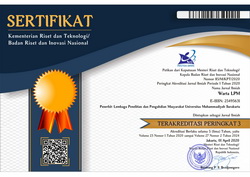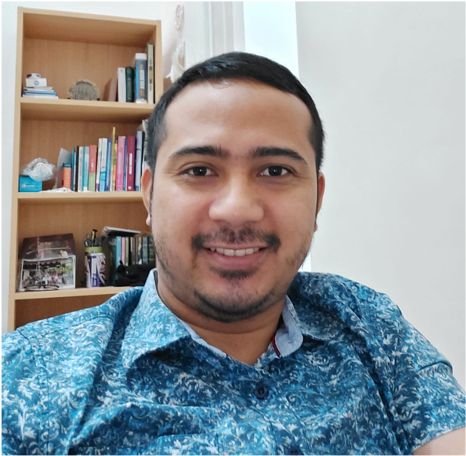Pendidikan Gizi Seimbang bagi Ibu-Ibu yang Memiliki Anak Usia 3-5 Tahun di Desa Kopen Boyolali
Keywords:
Balanced nutrition, children, mothers, nutritional educationAbstract
Low level of mothers’ knowledge on food and nutritional status has been reported to contribute the high prevalence of malnutrition of children aged 3-5 years in Kopen Village, District Teras Boyolali. The aim of this community service was to educate mothers about a balanced nutrition. Twenty-four mothers who have children aged 3-5 years were participated in this program. Each mother followed a half day nutritional education presented in 2 sections which were interactive discussion using power point and cooking demonstration. Before and after jointed the class, each mother completed a questionnaire consisted of 12 items questions about nutritional status and a balanced nutrition. The average (minimum, maximum) knowledge score before and after the program were 8.4 (5.0, 11.0) and 9.5 (7.0, 11.0) respectively. Of all participants, 70.8% showed an increase in their knowledge score following the program. The highest improvement of mothers’ knowledge score was on the statement ‘Children aged 1-3 year is a passive consumer, while 4-5 year is an active consumer’, followed by ‘Mother should not push children for eating when they are tired after playing’. While the lowest mothers’ knowledge score was on the statement ‘Fruits are not suitable for children because can cause diarrhoea’ followed by ‘Children who consume egg can suffered from allergy’ and ‘Meal cooking technique for children under 5 years is to cook the food until soft’.
Downloads
References
Appoh LY, Krekling S, 2005. Maternal nutritional knowledge and child nutritional status in the Volta Region of Ghana. Matern Child Nutr, 1:100-110.
Barbara AF, 1995. Use of cultural themes in promoting health among Southeast Asian refuges. The Science of Health Prom, 9:269-279.
Curtis V, Kanki B, Cousens S, Dialli I, Kpozehouen A, Sangare M, Nikiema M, 2001. Evidence of behaviour change following a hygiene promotion programme in Burkina Faso. Bulletin of World Health Organization, 79:518-526.
Dinas Kesehatan Boyolali, 2014. Profil Dinas Kesehatan Boyolali.
Mahama S, 2014. Relationship between Mothers’ Nutritional Knowledge in Childcare Practices and the Growth of Children Living in Impoverished Rural Communities. J Health Popul Nutr, 32:237-248.
Müller O, Krawinkel M, 2005. Malnutrition and health in developing countries. CMAJ, 173:279-286.
Notoatmodjo S, 2003. Ilmu Kesehatan Masyarakat Prinsip-prinsip Dasar. Jakarta: Penerbit Rineka Cipta.
Susanti S, Indriati G, Utomo W, 2013. Hubungan Pengetahuan Ibu tentang Gizi Dengan Status Gizi Anak usia 1-3 tahun. Universitas Riau.
Vallis M, Ruggiero L, Greene G, Jones H, Zinman B, Rossi S, Edwards L, Rossi JS, Prochaska JO, 2003. Stage of change for healthy eating in diabetes. Relation to demographic, eating-related, health care utilization and psychosocial factors. Diabetes Care, 26:1468-1474.
Wahyuni, 2015. Hubungan tingkat pengetahuan ibu tentang gizi balita dengan status gizi balita di wilayah kerja Puskesmas Pleret Bantul Yogyakarta. Naskah Publikasi. Program Studi Bidan Pendidik DIV Sekolah Tinggi Ilmu Kesehatan Aisyiyah Yogyakarta. http://opac.say.ac.id/810/1/NASKAH%20PUBLIKASI%20-%20 WAHYANI %20-%20201410104003%20-%20KELAS%20E.pdf
Wido S, 2015. Hubungan tingkat pengetahuan gizi ibu dan tingkat partisipasi ibu ke Posyandu dengan status gizi balita di Desa Kopen Kecamatan Teras Kabupaten Boyolali. Skripsi, Prodi Ilmu Gizi Universitas Muhammadiyah Surakarta.
Downloads
Submitted
Published
How to Cite
Issue
Section
License
Copyright (c) 2022 Warta LPM

This work is licensed under a Creative Commons Attribution 4.0 International License.














